Understanding the Mental Health Landscape for the Oldest Old
As the global population ages rapidly, especially the segment known as the oldest old—those aged 85 and above—the unique mental health challenges faced by this group demand urgent attention. With projections indicating that by 2030, one in six people worldwide will be aged 60 or older, and that the number reaching beyond 85 continues to rise, it becomes crucial to understand how aging impacts mental health. This article explores the complex interplay of biological, psychological, and social factors influencing mental health among the oldest old, highlighting current challenges, prevalent disorders, risk factors, barriers to care, and strategies for support.
Common Mental Health Challenges in the Oldest Old
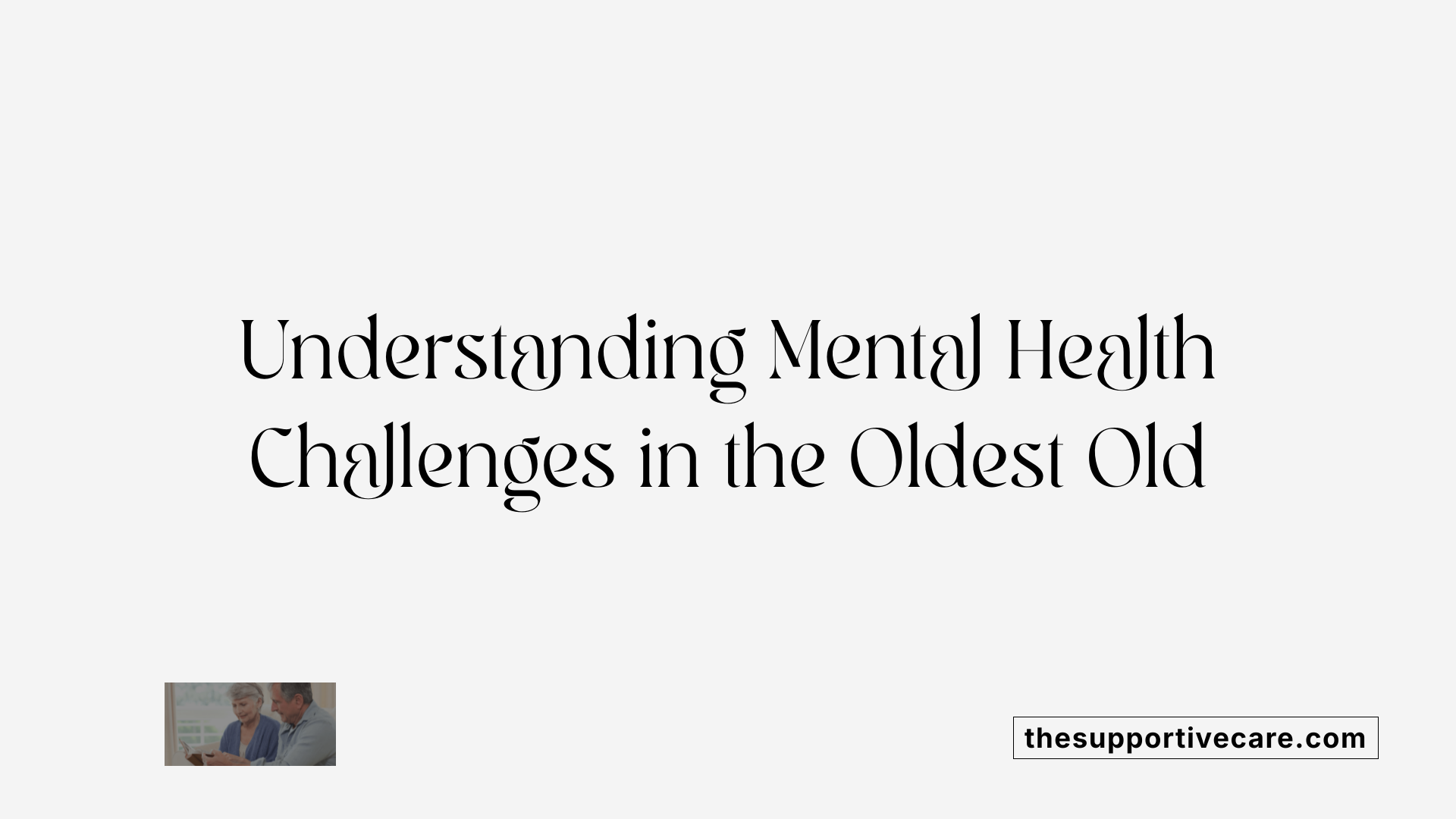
What are the common mental health challenges faced by the oldest old population?
The oldest old—typically those aged 85 and above—face a range of mental health challenges that significantly affect their quality of life. Anxiety and depression are among the most common conditions, often resulting from multiple factors such as loss of loved ones, chronic illnesses, and increased social isolation.
Many in this age group experience grief over recent bereavements and feelings of loneliness, which can exacerbate mental health issues. Social isolation, prevalent in this demographic, is linked to lower physical and emotional well-being and can lead to serious conditions like dementia. Abuse—whether physical, emotional, or neglect—further compounds these issues, making treatment and recognition more complex.
Cognitive decline, including neurodegenerative disorders like Alzheimer's disease and other dementias, is widespread. These conditions contribute to memory loss, disorientation, and difficulty with reasoning, severely impacting independence and mental health. Symptoms such as agitation, withdrawal, and behavioral changes often overlap with other mental health challenges, complicating diagnosis.
Physical health conditions also play a crucial role in mental health among the oldest old. Chronic diseases like cardiovascular issues, diabetes, and mobility impairments are associated with increased depression and anxiety risk. Medications for these conditions can sometimes worsen mental health symptoms or cause side effects that mimic psychiatric disorders.
Environmental and social factors, including limited access to healthcare, transportation barriers, and living in rural or isolated areas, further hinder appropriate mental health care for this age group. Without adequate support, these challenges can lead to decline in overall well-being.
Effective support for the oldest old requires a holistic approach—integrating medical, psychological, and social care—delivered with compassion and understanding. Improving healthcare provider training and expanding community-based resources are essential steps in addressing the complex mental health needs of this vulnerable population.
| Challenge Type | Specific Issues | Impact |
|---|---|---|
| Anxiety | Excessive worry, physical symptoms | Increased stress, health concerns |
| Depression | Sadness, loss of interest, physical discomfort | Reduced independence, higher suicide risk |
| Grief | Loss of loved ones, ending of meaningful relationships | Emotional distress, social withdrawal |
| Loneliness | Social isolation, lack of support networks | Decline in mental and physical health |
| Abuse | Physical, emotional, neglect, financial | Exacerbates mental health conditions |
| Cognitive Decline | Dementia, Alzheimer's, delirium | Memory loss, disorientation, behavioral issues |
Understanding and addressing these interconnected issues through community outreach, tailored health programs, and caregiver support can significantly improve the well-being of the oldest old.
Prevalent Mental Illnesses and Their Symptoms in Very Elderly Individuals
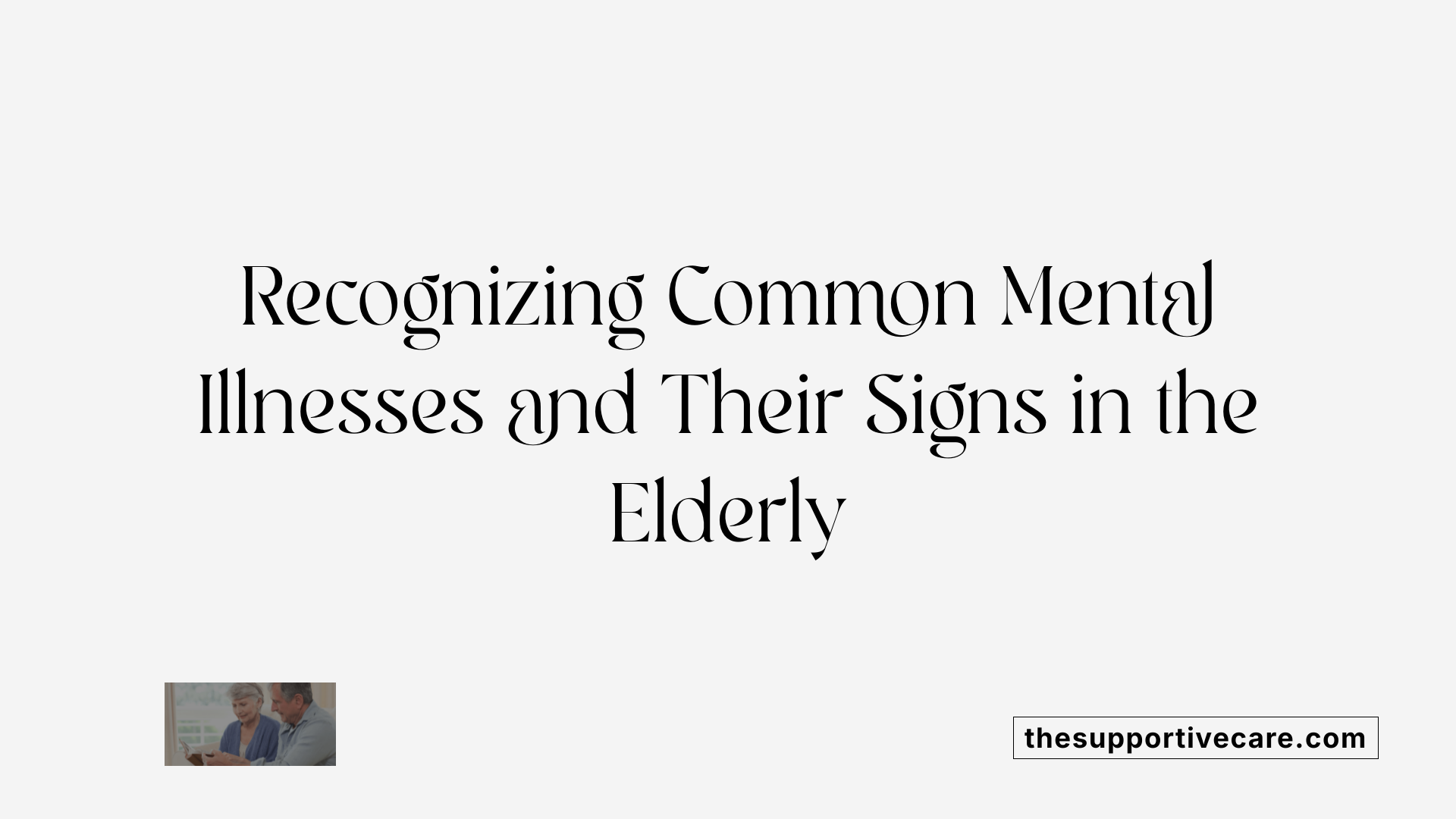
What mental health issues are prevalent among very elderly individuals and what are their symptoms, causes, and treatment options?
As individuals age into their late years, mental health problems become increasingly common. Depression, anxiety, dementia, and substance use disorders are among the most frequently observed conditions.
Symptoms of these mental health issues can vary. Depression often presents as persistent sadness, anhedonia (loss of interest in activities), fatigue, sleep disturbances, and feelings of hopelessness. Anxiety may manifest through excessive worry, restlessness, physical symptoms like trembling and gastrointestinal issues, and avoidance of social interactions. Dementia, including Alzheimer’s disease, typically shows early signs such as memory loss, confusion, difficulty with reasoning, and changes in personality. Substance use disorders might involve increased alcohol or drug consumption, often as a way to cope with physical pain or emotional distress.
The causes of mental health issues in the very elderly are multifaceted. Biological aging brings physiological changes in the brain, such as shrinkage in regions like the hippocampus, which affects memory and mood regulation. Social factors, including loneliness, bereavement, and social isolation, significantly impact mental health. Chronic physical illnesses like heart disease or diabetes can also contribute, either directly or through side effects of medications.
Addressing these conditions requires a comprehensive approach. Psychotherapy, including cognitive behavioral therapy (CBT), has proven effective in managing depression and anxiety. Medications, prescribed and monitored by healthcare providers, can also provide relief but must be used cautiously due to potential side effects and interactions with other drugs.
Community support programs play a vital role in strengthening social connections and providing practical assistance. Integrated care models that combine primary healthcare with mental health services are especially beneficial for older adults.
Early recognition of symptoms and timely consultation with healthcare professionals are essential. Resources like hotlines (e.g., 988 Suicide & Crisis Lifeline) and specialized programs can offer immediate help and ongoing support.
Understanding and treating mental health conditions among the very elderly improve their quality of life, reduce the burden of illness, and support aging with dignity and mental well-being.
The Cognitive Aging Process and Brain Changes
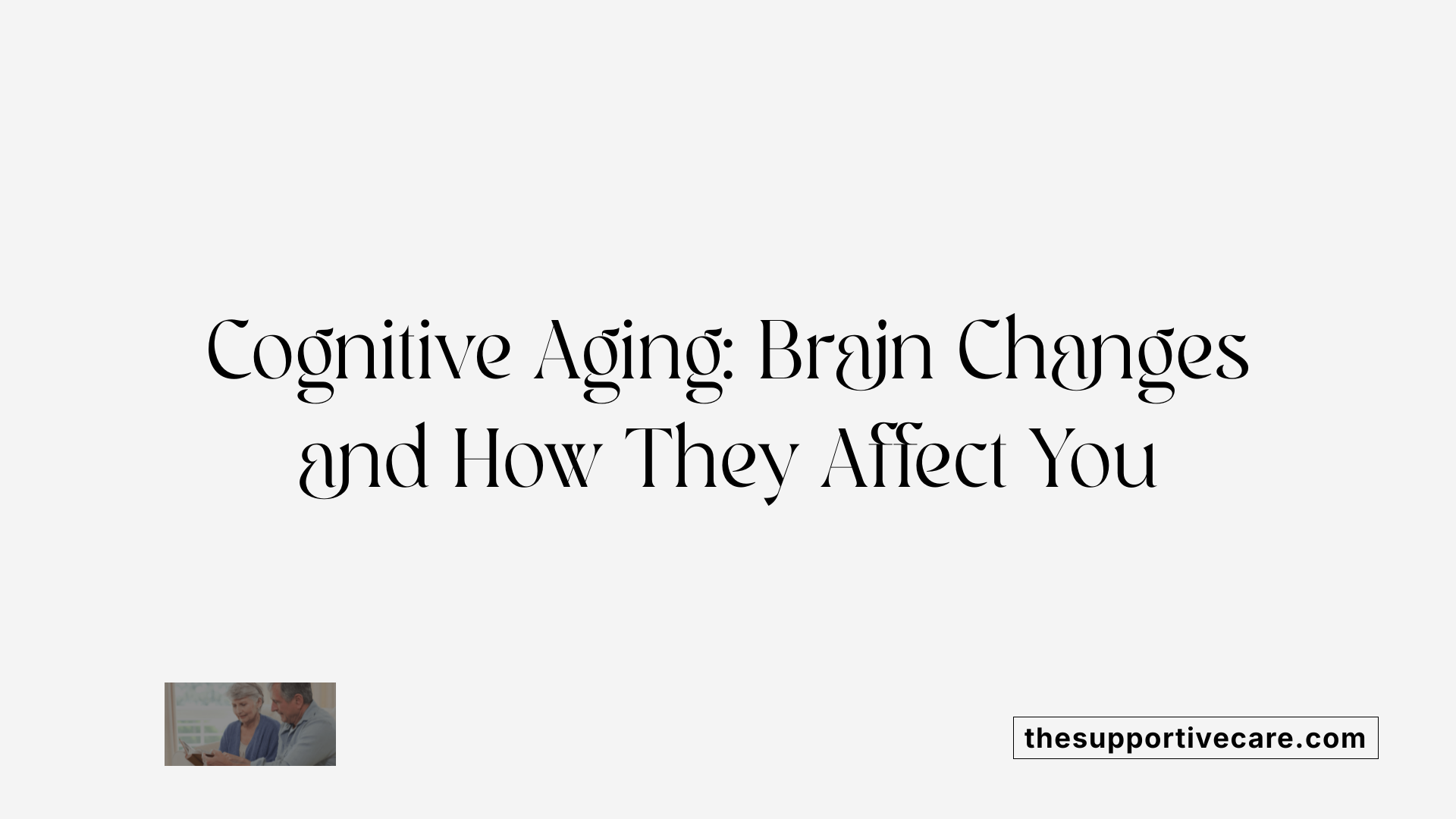
What are the mental deterioration processes associated with aging?
As individuals grow older, their brains undergo various structural and functional transformations. One prominent change is brain shrinking, particularly in regions like the frontal lobe and hippocampus, which are essential for memory, decision-making, and spatial navigation. This shrinkage results from neuron loss, decreased synaptic density, and reduced blood flow, all contributing to slower cognitive processing.
In addition to physical changes, aging is associated with increased inflammation and oxidative stress, which can impair neuronal health. These biological shifts lead to common cognitive challenges such as slower word recall, difficulty multitasking, and decreased attentional capacity. Many older adults experience mild forgetfulness or slower response times, but this does not necessarily indicate pathology.
Despite these changes, most older adults retain their ability to learn new skills, remember important information, and maintain language and knowledge abilities. This resilience is partly due to brain plasticity—the brain's capacity to reorganize and adapt—and the presence of cognitive reserve, developed through education, mental engagement, and healthy lifestyle choices.
Interestingly, some individuals, termed cognitive super-agers, demonstrate brain function and memory capacity similar to much younger people. They often maintain high levels of physical activity, social interaction, and mental stimulation, which seem to protect against typical age-related decline.
Lifestyle factors play a significant role in influencing the extent to which aging affects brain health. Regular physical activity, balanced nutrition, social engagement, and continuous learning can help slow cognitive deterioration and support overall mental well-being among older adults.
Risk Factors, Barriers, and Disparities in Mental Health for the Oldest Old
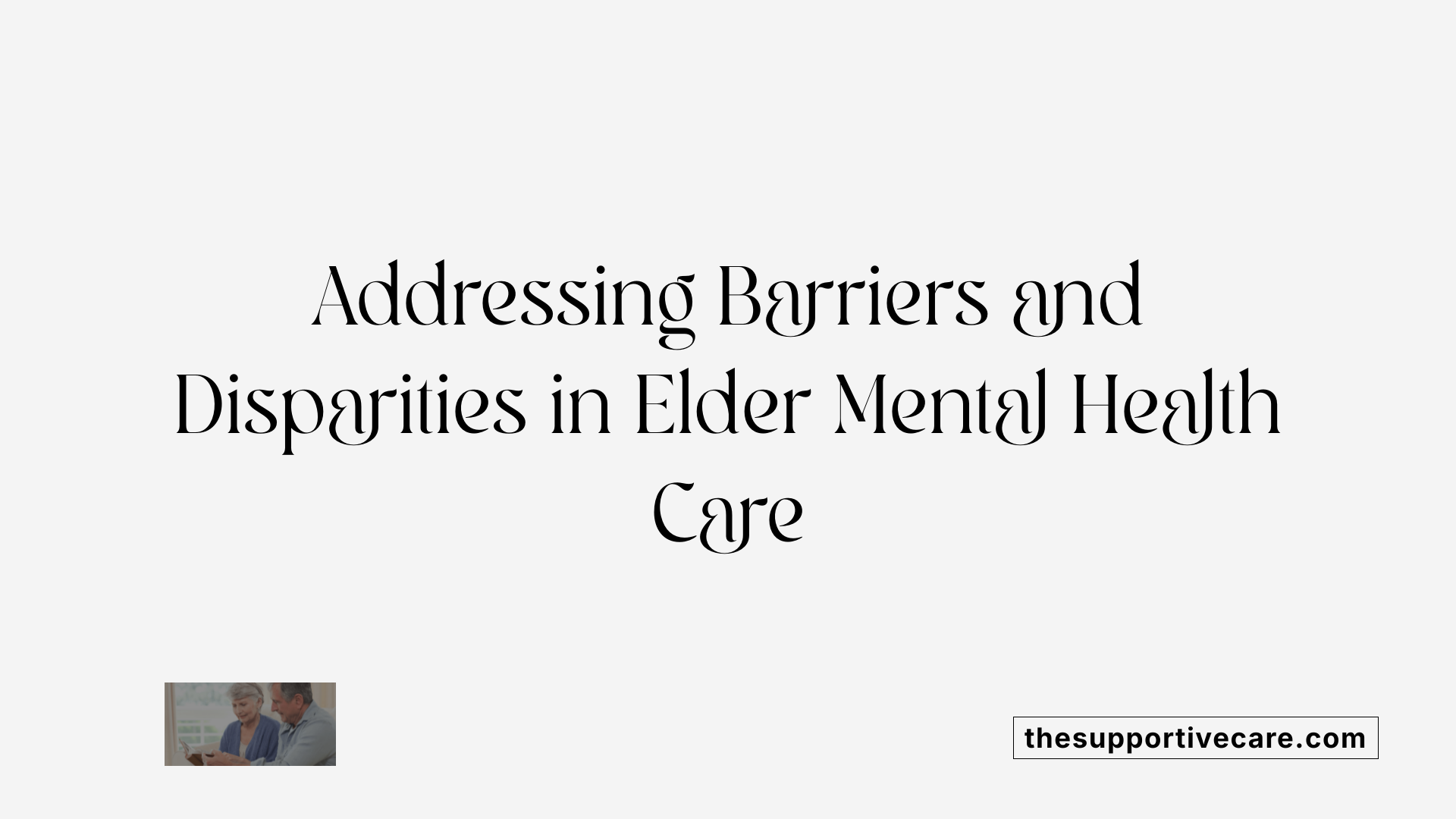
What are the risk factors and barriers affecting mental health among the elderly?
Older adults face a variety of challenges that can impact their mental well-being. Risk factors include social isolation, loneliness, losing loved ones, and dealing with chronic illnesses or disabilities. Significant life changes such as retirement, bereavement, and increased dependence on caregivers also contribute to mental health issues like depression and anxiety.
Elder abuse — whether physical, verbal, psychological, sexual, or financial — can lead to feelings of helplessness and worsen mental health conditions. Substance use, including alcohol and prescription medications, can exacerbate existing problems or trigger new ones.
Barriers to accessing proper mental health care are widespread. Many older adults experience stigma and negative beliefs about mental health treatment, leading to shame and reluctance to seek help. Cost is a major obstacle, especially for those on fixed incomes, combined with limited availability of specialized providers.
Mobility and transportation difficulties further restrict access, especially in rural or underserved areas. Additionally, inadequate digital literacy and lack of internet access hinder the ability to utilize telehealth services. Social stigma and fear of judgment often prevent older adults from discussing mental health concerns.
Vulnerable groups, such as those living in poverty or in isolated rural communities, face higher risks. They often have less awareness of available resources and fewer opportunities to receive appropriate care. In rural regions, healthcare facilities are sparse, making it difficult to find timely treatment.
Addressing these issues requires multi-faceted approaches: reducing stigma through education, expanding access to mental health services, providing community-based support, and tailoring interventions to meet the specific needs of older adults. Improving digital literacy and transportation options can also help ensure all elders can access the care they need.
Efforts to minimize disparities and barriers are essential for promoting mental health and well-being among the oldest populations, ensuring they receive respectful, comprehensive, and accessible care.
Supporting Mental Health in the Oldest Old: Strategies and Resources
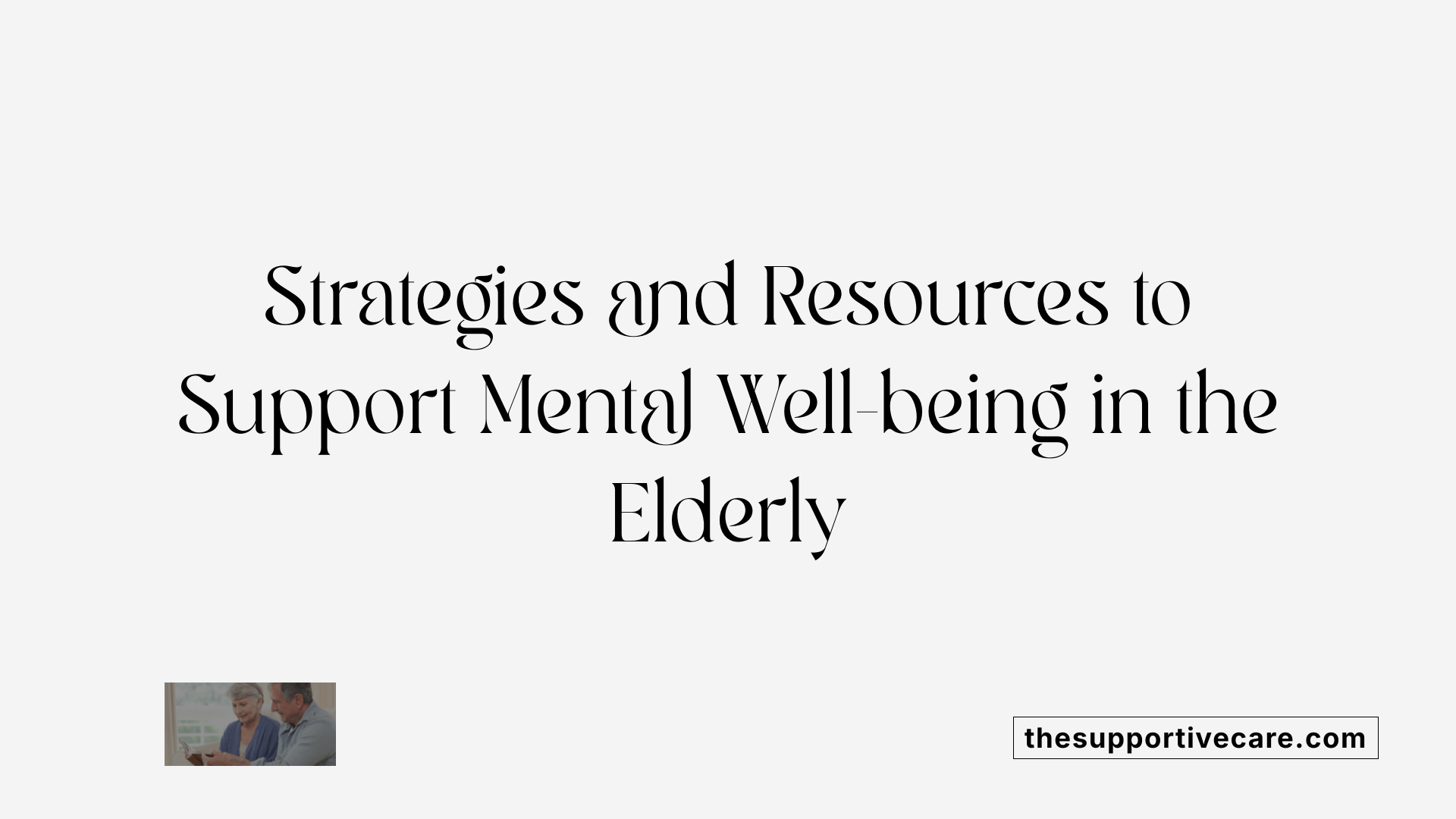
How can mental health in older adults be improved and supported?
Enhancing mental health among older adults requires a multifaceted approach that combines community engagement, healthcare integration, and caregiver support. Community programs play a vital role by fostering social connections through volunteer opportunities, social clubs, and activities tailored to seniors' interests. Such interactions can significantly reduce feelings of loneliness and social isolation, which are major risk factors for mental health issues.
Physical activity is also crucial; encouraging regular exercise, like walking or gentle yoga, alongside healthy eating habits and good sleep practices can boost both physical and emotional well-being. Cognitive stimulation activities—such as puzzles, reading, hobbies, or learning new skills—help maintain mental sharpness and resilience.
Addressing broader social factors is equally important. Ensuring older adults have access to financial resources, safe and accessible housing, and protection from elder abuse creates a stable environment conducive to mental health. Legal and policy initiatives aimed at promoting age-friendly communities and safeguarding rights further strengthen support systems.
Healthcare services tailored to the needs of older adults—such as integrated clinics that combine primary care, mental health screenings, and geriatric specialists—facilitate early detection and treatment of mental health conditions like depression or dementia. Routine mental health assessments by healthcare providers can catch issues early, improving outcomes.
Supporting caregivers is essential; providing resources such as training, respite care, and emotional support helps caregivers maintain their well-being, which positively impacts the care they provide. Community-based programs and policies that promote caregiver training and relieve caregiver burden are vital.
Overall, fostering a supportive environment through community initiatives, integrated healthcare, and caregiver empowerment is key. Reliable resources like crisis hotlines, local mental health services, and legal protections offer additional safety nets for older adults facing mental health challenges. These combined efforts contribute to healthier, more engaged, and mentally well-supported aging populations.
Towards a Holistic Approach for Aging Gracefully
The mental health needs of the oldest old are complex and require a coordinated, compassionate response that combines medical, social, and psychological interventions. Addressing stigma, improving access to care, fostering social connections, and investing in community-based programs are vital steps toward ensuring that the aging population can enjoy not only longer lives but also healthier and more fulfilling ones. As societies worldwide continue to embrace aging, the commitment to mental health support must be prioritized to safeguard the dignity, independence, and well-being of our most vulnerable seniors.
References
- Mental health of older adults - World Health Organization (WHO)
- Older Adults and Mental Health
- Older Americans Month: Highlighting Challenges and Opportunities
- Addressing the Unique Mental Health Challenges Brought on by ...
- What Mental Illnesses Affect Older Adults? - National Council on Aging
- Why Should We Care About the Mental Health of Older Adults?
- Older Adults and Mental Health: A Guide to Well-Being
- Mental health: The challenge for older adults and resources to help -
- Recognizing the Importance of Mental Health for Older Adults



































































































